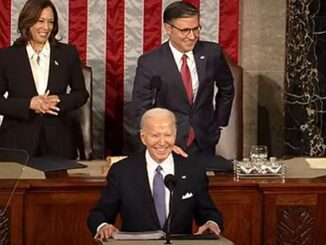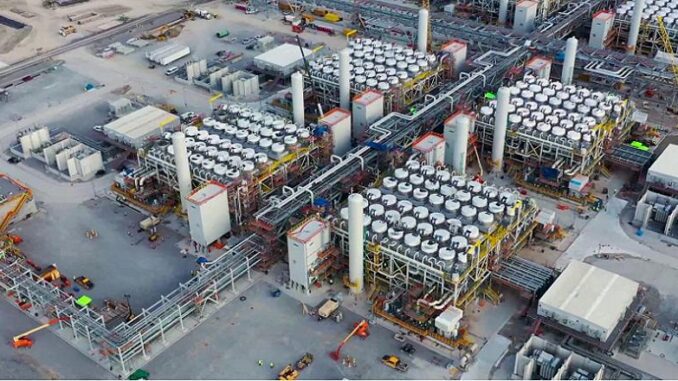
WASHINGTON, DC, January 26, 2024 (ENS) – Today, the Biden-Harris Administration announced a temporary pause on pending decisions regarding exports of liquefied natural gas, LNG, to countries that do not have free trade agreements with the United States.
The pause will last until the U.S. Department of Energy can update the underlying analyses for authorizations to accurately assess whether the proposed LNG export facilities are in the public interest, the White House said in a statement.
President Joe Biden explained why the pause is needed, saying, “The current economic and environmental analyses the Department of Energy uses to underpin its LNG export authorizations are roughly five years old and no longer adequately account for considerations like potential energy cost increases for American consumers and manufacturers beyond current authorizations or the latest assessment of the impact of greenhouse gas emissions.”
The 17 proposed LNG export projects affected by the pause have been opposed by frontline and environmental groups, because burning LNG releases methane into the atmosphere. Methane has a global warming capacity nearly 80 times greater than the most prevalent greenhouse gas, carbon dioxide (CO2).
“Today, we have an evolving understanding of the market need for LNG, the long-term supply of LNG, and the perilous impacts of methane on our planet,” Biden said. “The pause, which is subject to exception for unanticipated and immediate national security emergencies, will provide the time to integrate these critical considerations.”
During the pause, Biden explained, “we will take a hard look at the impacts of LNG exports on energy costs, America’s energy security, and our environment.”
The United States didn’t export LNG until February 2016, but in the intervening seven years, the country has become the number one exporter of LNG worldwide. And U.S. LNG exports are expected to double by the end of this decade, the President said.
The majority of US LNG is fracked in the Permian Basin, an area between New Mexico and Texas. It travels through pipelines across New Mexico and Texas, then is supercooled and loaded into ships along the Gulf Coast of Texas and Louisiana.
The United States exports 14 billion cubic feet of LNG per day (Bcf/d) in current operating capacity and 48 Bcf/d in total authorizations approved by the Energy Department to date, over three times current U.S. export capacity. This temporary pause on pending applications will not affect the 48 Bcf/d of LNG exports already authorized.
President Biden Wants to Consider Climate Impacts
“This pause on new LNG approvals sees the climate crisis for what it is: the existential threat of our time,” Biden declared.
“While MAGA Republicans willfully deny the urgency of the climate crisis, condemning the American people to a dangerous future, my administration will not be complacent. We will not cede to special interests.
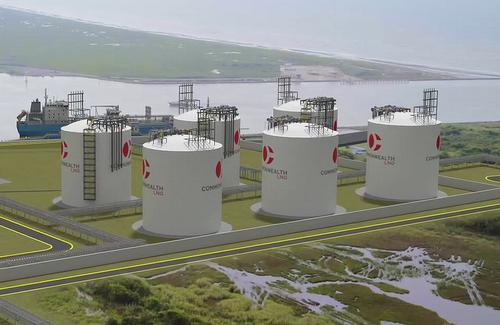
U.S. Secretary of Energy Jennifer Granholm said, “This administration is committed to the affordability of energy and economic opportunities for all Americans; strengthening energy security here in the US and with our allies; and protecting Americans against climate change and winning the clean energy future. This practical action will ensure that DOE remains a responsible actor using the most up-to-date economic and environmental analyses.”
Of prime importance, Biden said, is the need to “adequately guard against risks to the health of our communities, especially frontline communities in the United States who disproportionately shoulder the burden of pollution from new export facilities.”
“We will heed the calls of young people and frontline communities who are using their voices to demand action from those with the power to act,” he said. “And as America has always done, we will turn crisis into opportunity – creating clean energy jobs, improving quality of life, and building a more hopeful future for our children.”
Biden: Pause Will Not Affect U.S. Allies ‘Near-Term’
“At the same time,” the President said, “the U.S. remains unwavering in our commitment to supporting our allies around the world. Today’s announcement will not impact our ability to continue supplying LNG to our allies in the near-term.”
Last year, about half of U.S. LNG exports went to Europe, and the U.S. has worked with the European Union to economize consumption and manage its storage to ensure that unprovoked acts of aggression cannot threaten its supply.
In 2022, the EU and the United States pledged to work toward the goal of ensuring additional LNG volumes for the EU market. President Biden explained that the U.S. “has exceeded its annual delivery targets to the EU in each of the past two years.”
“Through existing LNG production and export infrastructure, the United States has – and will continue – to deliver for our allies,” Biden said.
“As Republicans in Congress continue to deny the very existence of climate change while attempting to strip their constituents of the economic, environmental and health benefits of the President’s historic climate investments, the Biden-Harris Administration will continue to lead the way in ambitious climate action while ensuring the American economy remains the envy of the world,” he said.
Reactions Span the Spectrum
Some groups strongly support the pause.
Abigail Dillen, President of the nonprofit public interest environmental law firm Earthjustice, said, “We applaud the Biden administration for taking this tremendously important step to align its decision-making on gas exports with U.S. climate goals. As communities across the country face the devastating impacts of the climate crisis and fossil fuel pollution, it’s never been clearer that rubber-stamping LNG exports is not in the public interest.”
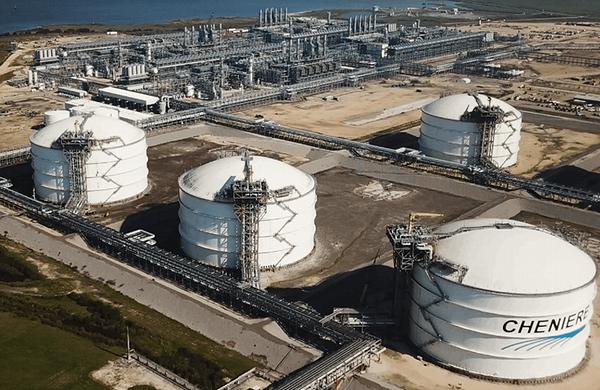
“The U.S. is now the largest exporter of methane gas in the world, and new LNG infrastructure threatens to keep us locked into decades of fossil fuel use and climate-warming emissions,” Dillen said. “Most LNG export facilities are proposed in the same communities of color and low-income communities that are already overburdened by fossil fuel pollution and on the frontlines of climate change.”
“We look forward to working with the Department of Energy to make sure that the environmental and economic risks of LNG exports are fully accounted for when it makes public interest determinations.,” Dillen said.
Tyson Slocum, director of the energy program with the nonprofit group Public Citizen, said, “For far too long, Big Oil executives have pursued an ‘America Last’ policy, price gouging consumers and pushing harmful export policies, in a myopic and ham-fisted vision that puts profit above everything. Reconsidering the impact fossil fuel exports have on our economy and climate is a vital step toward protecting American households from the impact LNG exports have on higher utility bills.”
“Eighty-five years ago, Congress mandated that natural gas exports must be ‘consistent with the public interest,’ and the federal government’s current approval process ignores the overwhelming evidence that LNG exports expose American families to higher energy costs, pollute communities of color, and spew greenhouse gas emissions that imperil our climate,” Slocum said.
“President Biden’s actions today mark a first step toward ensuring American households are protected by higher energy burdens caused by record exports, while safeguarding frontline communities disproportionately burdened by fossil fuel pollution,” Slocum said. “The pause of these LNG exports marks an important milestone on the pathway protecting our climate, and consumers from the greed of Big Oil.”
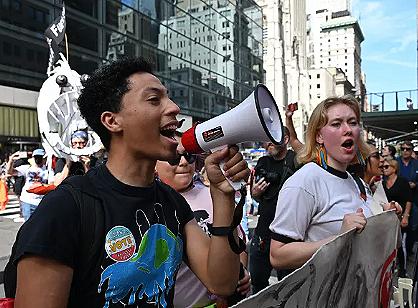
Gen-Z climate activists with the U.S. nonprofit Zero Hour are in favor of the pause, explaining that, “There are 20 proposed new LNG export facilities in the Gulf Coast. If all of these export terminals were built, and if current LNG exports continue, they would produce emissions equivalent to 688 coal-fired power plants.”
Zanagee Artis, executive director of Zero Hour, said, “We are pleased that the Biden Administration will consider climate in the approval of new liquified natural gas export terminals. This is a step in the right direction, but this decision must lead to the only scientifically sound conclusion: a complete rejection of all new LNG export permits. For President Biden to fulfill his promises to young people, he must reject federal permits for all new fossil fuel infrastructure and commit to completely phasing fossil fuels.”
But others are opposed.
The American Petroleum Institute joined the American Exploration and Production Council, Center for LNG, Independent Petroleum Association of America, LNG Allies, and dozens of other industry groups from across the LNG value chain in urging the Biden Administration to reject calls to halt permits for U.S. LNG export facilities.
In a letter to Secretary Granholm and senior administration officials, the groups emphasized the critical role that continued U.S. LNG exports play in safeguarding national security, creating U.S. jobs, supporting our European allies and contributing to global climate goals.
“Our nation’s abundant supply of natural gas is an impactful geopolitical tool, helping insulate American consumers from increasing global instability while advancing American national interests and ensuring the energy security of key U.S. allies,” the groups wrote. “Moving forward with a pause on new U.S. LNG export approvals would only bolster Russian influence and undercut President Biden’s own commitment to supply our allies with reliable energy, undermining American credibility and threatening American jobs.”
In Denver, Colorado, the Western States and Tribal Nations, WSTN, Natural Gas Initiative, led by state and sovereign tribal governments to drive rural and tribal economic development and lower global emissions, today urged the Biden Administration to reverse its pause of LNG export permit approvals to non-Free Trade Agreement nations.
“We are in a battle for the truth right now when it comes to the actual impact of U.S. LNG exports on the global environment. Political decisions like this risk damaging real-world progress toward reducing emissions in a substantive way,” WSTN President Andrew Browning said. “Our member companies right now are working with the Department of Energy to produce some of the world’s lowest methane-intensity LNG.”
“This pause risks four pending export approvals to India, which could cut its emissions footprint by 49.8 percent if it used Rockies natural gas to replace its current fuel choices,” Browning said.
As Japan’s Vice Minister for International Affairs at the Ministry of Economy, Trade and Industry, Hirai Hirohide, told a WSTN forum last year, Russia will be ‘pleased’ to step in if the U.S. does not provide LNG to its allies, especially in Asia,” Browning said.
The National Hispanic Energy Council, NHEC, also criticized the pause.
“Putting a hold on LNG export decisions is on par with the Administration’s decision to negotiate with Venezuela’s dictatorial regime and allow it resume oil and gas production, while hampering America’s domestic industry,” said NHEC Chair Julio Fuentes, who also serves as president and CEO of the Florida State Hispanic Chamber of Commerce.
“A policy change of this magnitude should not be considered because of narrow political interests, without taking into account the needs of all Americans, especially communities like ours that are integral to the nation’s economy and energy infrastructure,” Fuentes said. “We urge the administration to reconsider this decision and to acknowledge the potential negative outcomes on Hispanic families and the broader goals of environmental stewardship and domestic energy abundance.”
And there are those who believe the pause does not go far enough.
Greenpeace International is concerned about what it calls the “CP2 carbon bomb.”
In Cameron Parish on the coast of Louisiana, plans are underway to build a 550 acre, $10 billion LNG terminal that could ship 24 million tons of gas each year. Currently awaiting Federal Energy Regulatory Commission approval to begin construction, CP2 is expected to be a major greenhouse gas emission source – with annual lifecycle emissions of around 176 million tons of CO2e.
The CP2 project has become a test case for the buildout of LNG exports occurring across the Gulf Coast.
Carmen Gravatt, International Program Director, Greenpeace International, said, “We’re pleased to see the U.S. give a lifeline to the climate by making this sensible decision to halt all new LNG export project approvals, like the CP2 carbon bomb. If the US is serious about honoring its commitments under the Paris agreement, this pause needs to become permanent. Global climate bodies have long been warning us that if we want to achieve net zero by 2050 and secure a peaceful and livable planet we must stop new oil and gas.”
“If the emissions of planned US fossil fuel exports like this were counted toward totals, US emissions in 2030 would be as high as they were in 200,” Gravatt said. “FERC will likely regard the LNG exports as “in the public interest,” especially as the war in Ukraine has reduced Russian gas exports.”
World Resources Institute U.S. Director Dan Lashof is calling on President Biden to “commit unambiguously” to ending the practice of approving permits for new LNG terminals. Lashof said that if approved, “CP2 would be the largest LNG export terminal in the U.S., locking in climate warming emissions and fossil fuel dependence that will slow the adoption of clean energy.”
The Details
President Biden’s announcement affects pending Energy Department decisions to approve 17 U.S. LNG projects.
Of the 17 pending applications for U.S. projects, five are for projects that were canceled or will likely be canceled, and two are for small additions to existing terminals.
Three applications are for large expansions of existing or planned terminals:
- – Port Arthur LNG Phase II
- – Corpus Christi Liquefaction Midscale
- – Venture Global Plaquemines LNG Design Increase
These expansions could emit an estimated 103 to 131 million tons of CO2 equivalent, tCO2e, per year.
Plans for seven major new U.S. export terminals are also impacted by the pause:
- – Lake Charles Exports (Energy Transfer Lake Charles LNG),
- – New Fortress Energy Louisiana FLNG (Louisiana Fast LNG),
- – Magnolia LNG,
- – Commonwealth LNG,
- – Venture Global CP2 LNG,
- – Gulfstream LNG, and
- – Fourchon LNG.
These terminals could emit around a total of 565 million tCO2e per year.
The announcement may also impact approvals for LNG exports from Mexico that rely on U.S.-produced gas. Two such projects are currently pending approval.
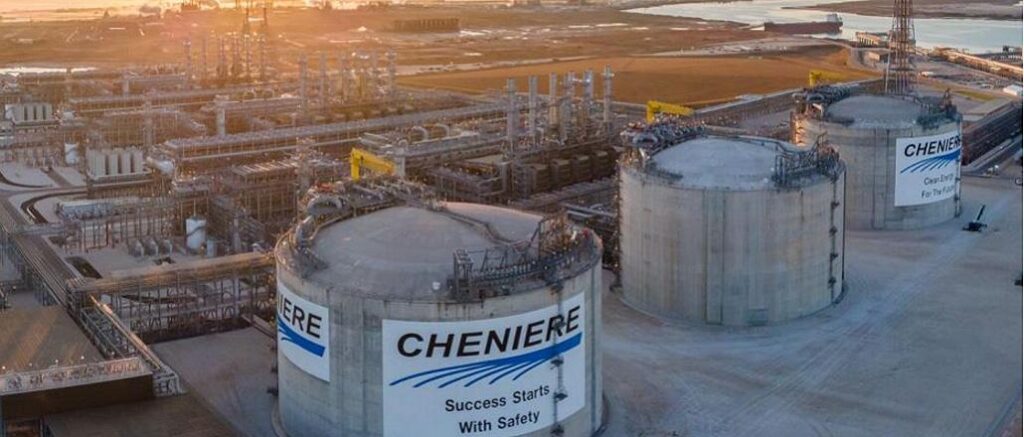
Congress Divided
Senator Thom Tillis of North Carolina, a Republican, and 25 of his Republican colleagues criticized the Biden Administration for the pause in a letter addressed to the President and Energy Secretary Granholm.
“American LNG exports have enhanced our geopolitical influence and international energy security across the board since 2016. In addition to Europe, U.S. LNG has a significant impact on energy security in Asia. Japan and South Korea have been the top two destinations for importing U.S. LNG,” the Republicans wrote. “Taiwan also imports U.S. LNG, and India is rapidly increasing its imports as well. According to EIA, the four Asian countries accounted for one-fifth of U.S. LNG exports between January and October of 2023.7 Stable and secure supplies of U.S. LNG are critical to their energy security.”
LNG exports from the United States are also uniquely suited to decrease global emissions. Both China and India, two of the largest polluters globally, are top destinations for U.S. LNG exports. Efforts to limit the export of LNG from the United States thus directly undermines the ability to reduce emissions through the use of clean-burning natural gas,” the Republicans wrote.
“Limiting U.S. LNG exports does not have any impact on the world’s demand for natural gas. Instead, countries including Russia and Iran will simply produce more energy that is subject to less stringent environmental regulations. As a result, limiting American LNG exports in the name of stopping climate change could do just the opposite and add to global emissions,” the Republican lawmakers wrote.
In Congress, the announcement riled some Democrats, too, people such as Senator Joe Manchin, the West Virginia Democrat who chairs the U.S. Senate Energy and Natural Resources Committee,.
“Unfortunately, the announcement today reminds me of the ill-advised and unlawful pause on oil and gas leasing this administration attempted to put in place in the name of climate. If the administration has the facts to prove that additional LNG export capacity would hurt Americans, they must make that information public and clear. But if this pause is just another political ploy to pander to keep-it-in-the-ground climate activists at the expense of American workers, businesses, and our allies in need, I will do everything in my power to end this pause immediately,” Manchin said.
“I will hold a hearing on LNG in the coming weeks to unveil the facts about the true state of play in the markets, this administration’s motivations, and their implications,” said Manchin. “Let me be crystal clear: America’s LNG policy should be based on facts, not politics. The indisputable facts are that, to-date, America’s LNG production has strengthened our economy, created good-paying jobs, supported the energy needs of our allies around the world, and helped reduce global emissions.”
On the other hand, Senator Edward Markey, a Massachusetts Democrat who chairs the Environment and Public Works Subcommittee on Clean Air, Climate, and Nuclear Safety, said, “For too long, the United States served as an enabler for Big Oil and Big Gas’s get-rich-quick scheme, as it got countries around the world addicted to fossil fuels at the expense of American families. This surge in natural gas exports was matched by rising energy costs at home and soaring global temperatures driven by fossil-fueled climate change. I applaud the Biden administration for this much-needed move to protect American communities from export-driven pollution and profiteering.”
Senator Markey is the author of the Block All New (BAN) Fossil Fuel Exports Act, which would reinstate the fossil fuel export ban that was lifted in 2015, prioritize U.S. consumers against fossil fuel profiteering, and help ensure the United States meets its climate and clean energy commitments on the world stage.
In December 2023, Markey co-led a letter from international parliamentarians on the globally recognized need to halt the construction and expansion of LNG export facilities. The letter advocates “an immediate moratorium on the expansion of LNG infrastructure, ending the public financing and permitting of these harmful projects.”
Featured image: Venture Global wins approval for final liquification block at its Calcasieu Pass LNG plant in Louisiana. (Photo courtesy Louisiana Illuminator)
© 2024, Environment News Service. All rights reserved. Content may be quoted only with proper attribution and a direct link to the original article. Full reproduction is prohibited.



